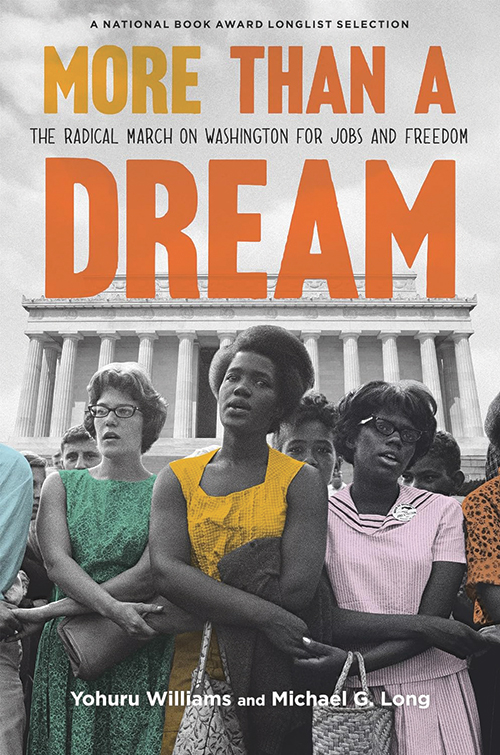
More Than a Dream: The Radical March on Washington for Jobs and Freedom
Reviewed by Gwen Gosney Erickson
May 1, 2024
By Yohuru Williams and Michael G. Long. Farrar, Straus and Giroux, 2023. 272 pages. $21.99/hardcover; $11.99/eBook. Recommended for ages 10–14.
This review was featured in the May 2024 episode of the Quakers Today podcast.
Sixty years after the event, plenty of information is now available about the 1963 March on Washington. The title of this book, which targets middle-grade readers, gives a sense of why it’s a worthy addition to bookshelves. It delivers more than the quick facts and quotes centering on Martin Luther King Jr.’s monumental “I Have a Dream” speech. While marketed for adolescent readers, it is an enjoyable and educational read for all ages.
This book is authored by knowledgeable, experienced writers Yohuru Williams and Michael G. Long who have particular expertise in presenting civil rights history to a general audience. They also recently coauthored a critically acclaimed biography, Call Him Jack: The Story of Jackie Robinson, Black Freedom Fighter (2022). Fans of Quaker Bayard Rustin will likely recognize Michael G. Long’s name from Rustin’s edited letters, I Must Resist: Bayard Rustin’s Life in Letters (2012), and Long’s first book for young people, Troublemaker for Justice: The Story of Bayard Rustin, the Man Behind the March on Washington (2019), which he coauthored with Jacqueline Houtman and Walter Naegle, Rustin’s longtime partner.
This book opens with Rustin meeting with his mentor, A. Philip Randolph, to discuss strategy for what would become the August 28, 1963 March on Washington for Jobs and Freedom. Prior to the first chapter, the authors include a thoughtful statement on language that frames historical descriptions of racial identity, some archaic and others hateful and hurtful. The authors sprinkle this type of careful, age-appropriate but accurate, added-value text throughout the book. Additionally, there are sidebar discussions providing further context for terminology (“Capitalism and Socialism”), historical events (“The Emancipation Proclamation”), and key individuals (“Ella Baker and Fannie Lou Hamer”). There are not only images from the march but also images of key documents in full, giving readers access to core primary sources to learn firsthand about planning and implementing the march and related press coverage. The book closes with “Extra Steps,” a list of additional fun facts and “Things to Consider,” which provides 16 sets of questions that encourage deeper reflections and personal engagement with the story.
While written for younger readers, the book does not shy away from complexities and missteps: disagreements among the planners, Rustin’s homosexuality, White privilege, and the violence and danger faced by civil rights activists. Notable is the clear naming of women being essential organizers and activists who were nevertheless excluded from visible planning and speaking roles. Those familiar with this history will appreciate mentions of Pauli Murray and Gloria Steinem, which foreshadow the rise of second-wave feminism. Acknowledgment is also given to restrictions on and limited inclusion of young people in both planning and participation.
More Than a Dream can be read individually but would also lend itself well to group reading in a First-day school class or a book club setting. The authors deliver a full package, thanks to the inclusion of primary source illustrations, sidebars, thoughtful queries within the text, and the questions set with suggested assignments at the end. This book also pairs well with the aforementioned Troublemaker for Justice and with Congressman John Lewis’s graphic memoir March trilogy (coauthored by Andrew Aydin and illustrated by Nate Powell, completed in 2016).
Gwen Gosney Erickson is a Quaker archivist at Guilford College in Greensboro, N.C. Her interests as a historian focus on the intersections of Quaker studies, African American history, women’s studies, U.S. social justice movements, and ways that faith and identity inform our historical narratives.



Comments on Friendsjournal.org may be used in the Forum of the print magazine and may be edited for length and clarity.